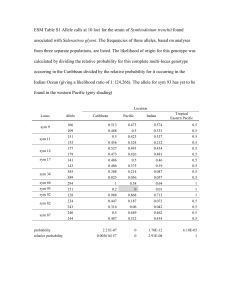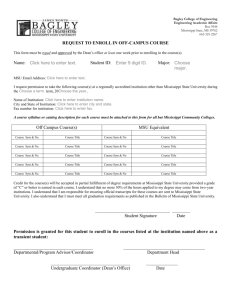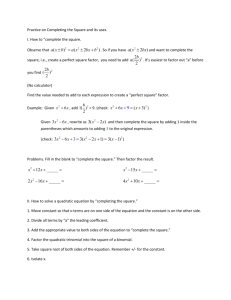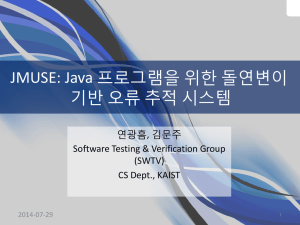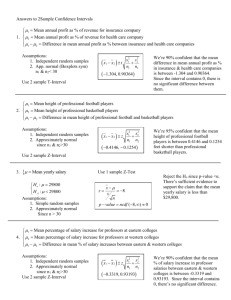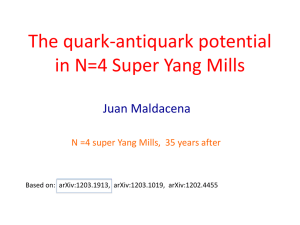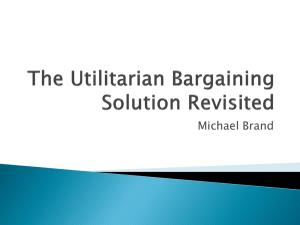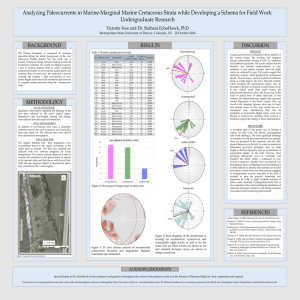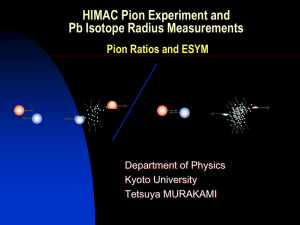Homework 5
advertisement
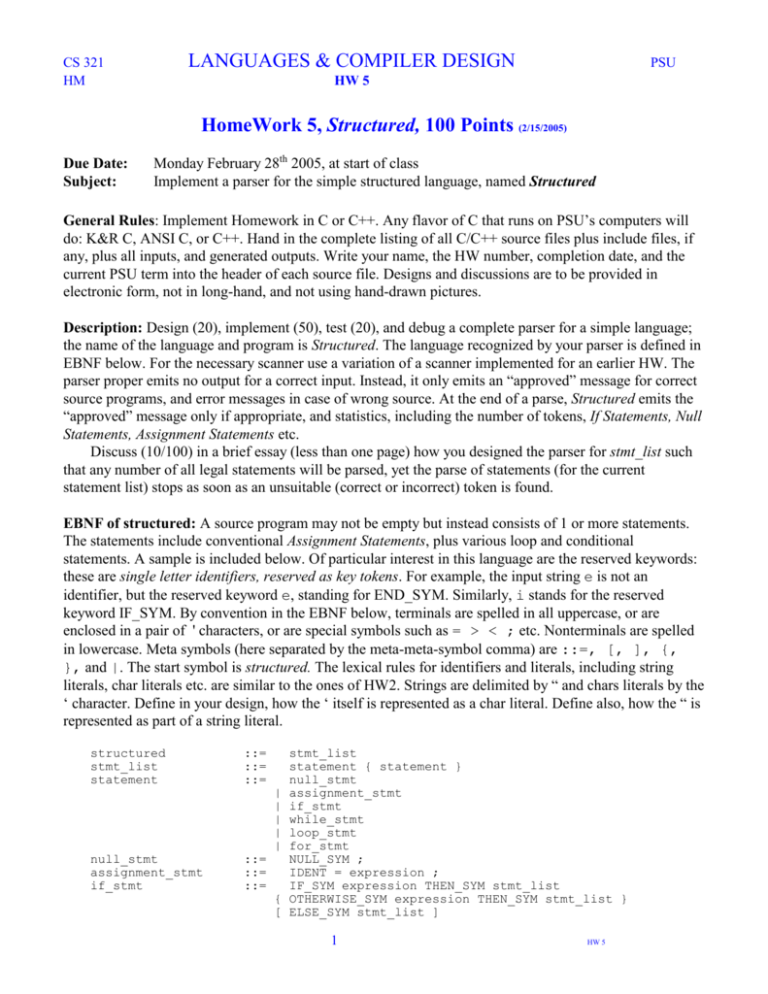
LANGUAGES & COMPILER DESIGN
CS 321
HM
PSU
HW 5
HomeWork 5, Structured, 100 Points (2/15/2005)
Due Date:
Subject:
Monday February 28th 2005, at start of class
Implement a parser for the simple structured language, named Structured
General Rules: Implement Homework in C or C++. Any flavor of C that runs on PSU’s computers will
do: K&R C, ANSI C, or C++. Hand in the complete listing of all C/C++ source files plus include files, if
any, plus all inputs, and generated outputs. Write your name, the HW number, completion date, and the
current PSU term into the header of each source file. Designs and discussions are to be provided in
electronic form, not in long-hand, and not using hand-drawn pictures.
Description: Design (20), implement (50), test (20), and debug a complete parser for a simple language;
the name of the language and program is Structured. The language recognized by your parser is defined in
EBNF below. For the necessary scanner use a variation of a scanner implemented for an earlier HW. The
parser proper emits no output for a correct input. Instead, it only emits an “approved” message for correct
source programs, and error messages in case of wrong source. At the end of a parse, Structured emits the
“approved” message only if appropriate, and statistics, including the number of tokens, If Statements, Null
Statements, Assignment Statements etc.
Discuss (10/100) in a brief essay (less than one page) how you designed the parser for stmt_list such
that any number of all legal statements will be parsed, yet the parse of statements (for the current
statement list) stops as soon as an unsuitable (correct or incorrect) token is found.
EBNF of structured: A source program may not be empty but instead consists of 1 or more statements.
The statements include conventional Assignment Statements, plus various loop and conditional
statements. A sample is included below. Of particular interest in this language are the reserved keywords:
these are single letter identifiers, reserved as key tokens. For example, the input string e is not an
identifier, but the reserved keyword e, standing for END_SYM. Similarly, i stands for the reserved
keyword IF_SYM. By convention in the EBNF below, terminals are spelled in all uppercase, or are
enclosed in a pair of ' characters, or are special symbols such as = > < ; etc. Nonterminals are spelled
in lowercase. Meta symbols (here separated by the meta-meta-symbol comma) are ::=, [, ], {,
}, and |. The start symbol is structured. The lexical rules for identifiers and literals, including string
literals, char literals etc. are similar to the ones of HW2. Strings are delimited by “ and chars literals by the
‘ character. Define in your design, how the ‘ itself is represented as a char literal. Define also, how the “ is
represented as part of a string literal.
structured
stmt_list
statement
::=
::=
::=
|
|
|
|
|
null_stmt
assignment_stmt
if_stmt
::=
::=
::=
{
[
stmt_list
statement { statement }
null_stmt
assignment_stmt
if_stmt
while_stmt
loop_stmt
for_stmt
NULL_SYM ;
IDENT = expression ;
IF_SYM expression THEN_SYM stmt_list
OTHERWISE_SYM expression THEN_SYM stmt_list }
ELSE_SYM stmt_list ]
1
HW 5
CS 321
HM
LANGUAGES & COMPILER DESIGN
PSU
HW 5
while_stmt
::=
loop_stmt
for_stmt
::=
::=
expression
bool_op
relation
relop
simple_expression
add_op
term
mult_op
factor
primary
literal
::=
::=
::=
::=
::=
::=
::=
::=
::=
::=
::=
END_SYM IF_SYM ;
WHILE_SYM expression LOOP_SYM
stmt_list
END_SYM LOOP_SYM ;
LOOP_SYM stmt_list END_SYM LOOP_SYM ;
FOR_SYM IDENT = expression UPTO_SYM expression LOOP_SYM
stmt_list
END_SYM LOOP_SYM ;
relation { bool_op relation }
AND_SYM | OR_SYM | XOR_SYM
simple_expression { relop simple_expression }
= | > | <
term { add_op term }
+ | factor { mult_op factor }
* | /
primary [ ^ primary ]
( expression ) | literal | IDENT
STRING_LIT | CHAR_LIT | NUM_LIT | NULL_SYM
Reserved Keyword List: Each reserved keyword is spelled as a single letter identifier. Both lowercase
and uppercase versions are allowed. The complete list of reserved keywords follows:
AND_SYM
IF_SYM
END_SYM
THEN_SYM
OTHERWISE_SYM
OR_SYM
WHILE_SYM
XOR_SYM
FOR_SYM
UPTO_SYM
LOOP_SYM
ELSE_SYM
NULL_SYM
=
=
=
=
=
=
=
=
=
=
=
=
=
a
i
e
t
o
r
w
x
f
u
l
s
n
|
|
|
|
|
|
|
|
|
|
|
|
|
A
I
E
T
O
R
W
X
F
U
L
S
N
A Sample Source Program: Demonstrate your parser handles the source program below correctly.
// PSU CS 321
// statement parser
// name: ... date: ...
h_1 = 12;
i h_1 = mary_2 t
xx = 12 ^ ( max ^ 2 );
e i;
n;
f ident = 12 u 13 l
ex = "hello";
e l;
n;
f index = 0 u 100 l
f j_dex = max u max + 109 l
j_dex = j_dex + 1;
e l;
expr = 12 > od r "hello" = str;
foo = 12 * 8 + ( 12 ^ 8 / 3 - 12 );
2
//
//
//
//
//
assign
if condition then
assign
end if;
null statement
HW 5
LANGUAGES & COMPILER DESIGN
CS 321
HM
e
i
o
o
PSU
HW 5
w j_dex > min l
n;
j_dex = j_dex - this;
e l;
l;
aa > bb t
aa = bb;
aa > cc t
aa = cc;
aa > dd t
aa = dd;
// OTHERWISE == ELSIF
s
aa = 0;
e i;
Minimal Required Testing: Supply test cases of your own construction. In addition, test the Sample
Source Program above. Show with other separate tests that all of the following error cases are all handled
correctly via suitable error message. This includes line number, column number, what is expected, and
what was found instead:
THEN_SYM expected but not found in if_stmt
Expression malformed
Program empty --may have nothing but comments
Semicolon missing at end of statement
END_SYM expected but not found in if_stmt
IF_SYM expected but not found at end in if_stmt
LOOP_SYM expected but not found in for_stmt
END_SYM expected but not found in for_stmt
LOOP_SYM expected but not found at end in for_stmt
= expected but not found in for_stmt
UPTO_SYM expected but not found in for_stmt
LOOP_SYM expected but not found in while_stmt
END_SYM expected but not found in while_stmt
LOOP_SYM expected but not found at end in while_stmt
Empty stmt_list in while_stmt
LOOP_SYM expected but not found in loop_stmt
END_SYM expected but not found in loop_stmt
LOOP_SYM expected but not found at end in loop_stmt
Illegal use of multiple exponentiation operators ^ in expression
Missing ) in expression
3
HW 5
